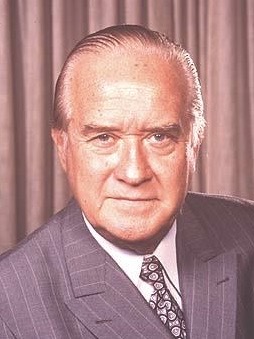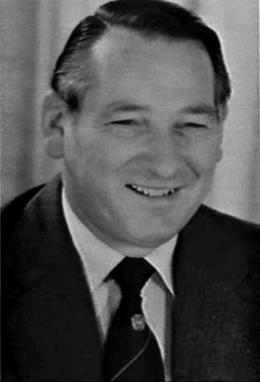Related Research Articles

Sir Robert William Askin, GCMG, was an Australian politician and the 32nd premier of New South Wales from 1965 to 1975, the first representing the Liberal Party. He was born in 1907 as Robin William Askin, but always disliked his first name and changed it by deed poll in 1971. Before being knighted in 1972, however, he was generally known as Bob Askin. Born in Sydney in 1907, Askin was educated at Sydney Technical High School. After serving as a bank officer and as a sergeant in the Second World War, Askin joined the Liberal Party and was elected to the seat of Collaroy at the 1950 election.

Sir Eric Archibald Willis was an Australian politician, Cabinet Minister and the 34th Premier of New South Wales, serving from 23 January 1976 to 14 May 1976. Born in Murwillumbah in 1922, Willis was educated at Murwillumbah High School and the University of Sydney, where he obtained a Bachelor of Arts with double honours. Enlisting during World War II, Willis served on the homefront and later served in New Guinea and the Philippines. He continued to serve the Citizen Military Forces until 1958.

Pittwater is an electoral district of the Legislative Assembly in the Australian state of New South Wales. Located in Sydney's north-east, it is 175.32 km2 in size, and comprises a part of the local government area of Northern Beaches Council, mostly the portion that was formerly Pittwater Council.
Bruce Laurence Webster was an Australian broadcaster and politician. He worked for the Australian Broadcasting Commission (ABC) from 1947, joining as a messenger boy, then becoming an announcer and newsreader. He was the member for Pittwater, in the New South Wales Legislative Assembly from 8 February 1975 until 21 July 1978.

A general election for the New South Wales Legislative Assembly was held in the state of New South Wales, Australia, on Saturday 1 May 1976. The result was a narrow win for the Labor Party under Neville Wran—the party's first in the state in more than a decade.

The 1978 New South Wales state election was held on 7 October 1978 to elect all 99 members of the New South Wales Legislative Assembly. The Labor Party defeated the incumbent Liberal/National coalition government in a landslide victory under leader Neville Wran, with the election popularly known as the "Wranslide".
Members of the New South Wales Legislative Assembly who served in the 44th parliament held their seats from 1973 to 1976. They were elected at the 1973 state election, and at by-elections. The Speaker was Jim Cameron.
Collaroy was an electoral district of the Legislative Assembly of the Australian state of New South Wales, created in the 1949 redistribution and first contested at the 1950 state election. The seat was created out of a large area covered by the seats of Hornsby to the north and Manly to the south. It was named after and included the Sydney suburb of Collaroy. It was abolished in 1973 and mostly replaced by Pittwater, with part of it being added to Wakehurst.

Richard Owen Healey was a New South Wales politician, ABC sports broadcaster, and minister of the crown in the cabinets of Sir Robert Askin, Tom Lewis and Sir Eric Willis. From 1973 to 1975 he was Minister for Youth and Community Services, when he was made Minister for Health, which he held until the Coalition lost office in May 1976. He was a member of the New South Wales Legislative Assembly for 19 years from 3 March 1962 until his retirement on 28 August 1981 for the Liberal Party.

John Clarkson Maddison was a New South Wales politician, Attorney General, Minister for Justice and Deputy Leader for the Liberal Party of New South Wales in the cabinets of Robert Askin, Tom Lewis and Sir Eric Willis until the Liberal party lost the 1976 election. Maddison was first elected to the New South Wales Legislative Assembly for the Electoral district of Hornsby in 1962 until 1973 and thereon as member for Ku-ring-gai until his retirement in 1980.
Ian Ross Griffith was an Australian politician and a member of the New South Wales Legislative Assembly from 1956 until 1978. He was a member of the Liberal Party and held ministerial positions in the governments of Sir Robert Askin and Eric Willis.
Pittwater, an electoral district of the Legislative Assembly in the Australian state of New South Wales, was created in 1973, replacing a large part of Collaroy and elections have generally been won by the Liberal party.
The Askin–Cutler ministry (1965–1968) or First Askin ministry was the 62nd ministry of the government of New South Wales, and was led by the 32nd Premier, Bob Askin, of the Liberal Party in coalition with the Country Party, led by Charles Cutler. The ministry was the first occasion in the history of government in New South Wales that the Liberal and Country Party formed a coalition in government. It was also the first of six occasions when Askin was Premier; and when Cutler was Deputy Premier.
The Askin–Cutler ministry (1968–1969) or Second Askin ministry was the 63rd ministry of the Government of New South Wales, and was led by the 32nd Premier, Bob Askin, of the Liberal Party in coalition with the Country Party, led by Charles Cutler. It was the second of six occasions when Askin was Premier; and when Cutler was Deputy Premier.
The Askin–Cutler ministry (1969–1971) or Third Askin ministry was the 64th ministry of the Government of New South Wales, and was led by the 32nd Premier, Bob Askin, of the Liberal Party in coalition with the Country Party, led by Charles Cutler. It was the third of six occasions when Askin was Premier; and when Cutler was Deputy Premier.
The Askin–Cutler ministry (1971–1973) or Fourth Askin ministry was the 65th ministry of the New South Wales Government, and was led by the 32nd Premier, Bob Askin, of the Liberal Party in coalition with the Country Party, led by Charles Cutler. It was the fourth of six occasions when Askin was Premier; and when Cutler was Deputy Premier.
The Askin–Cutler ministry (1973) or Fifth Askin ministry was the 66th ministry of the government of New South Wales, and was led by the 32nd Premier, Sir Robert Askin, of the Liberal Party in coalition with the Country Party, led by Sir Charles Cutler. It was the fifth of six occasions when Askin was Premier and when Cutler was Deputy Premier.
The Askin–Cutler ministry (1973–1975) or Sixth Askin ministry was the 67th ministry of the government of New South Wales, and was led by the 32nd Premier, Sir Robert Askin, of the Liberal Party in coalition with the Country Party, led by Sir Charles Cutler. It was the sixth and final occasion when Askin was Premier; and when Cutler served as Deputy Premier to Askin.
The Lewis–Cutler ministry or First Lewis ministry was the 68th ministry of the New South Wales Government, and was led by the 33rd Premier, Tom Lewis, of the Liberal Party in coalition with the Country Party, led by Sir Charles Cutler. It was the first of two occasions when Lewis was Premier; and the seventh and final occasion when Cutler served as Deputy Premier.
A by-election was held for the New South Wales Legislative Assembly electorate of Lane Cove on 8 February 1975 because of the resignation of Attorney General Ken McCaw (Liberal).
References
- 1 2 "Sir Robert (Robin William) Askin (1907–1981)". Former members of the Parliament of New South Wales . Retrieved 3 May 2019.
- ↑ "Writ of election: Pittwater". Government Gazette of the State of New South Wales . No. 8. 7 January 1975. p. 55. Retrieved 15 November 2019– via Trove.
- 1 2 Green, Antony. "1975 Pittwater by-election". New South Wales Election Results 1856-2007. Parliament of New South Wales . Retrieved 15 November 2019.